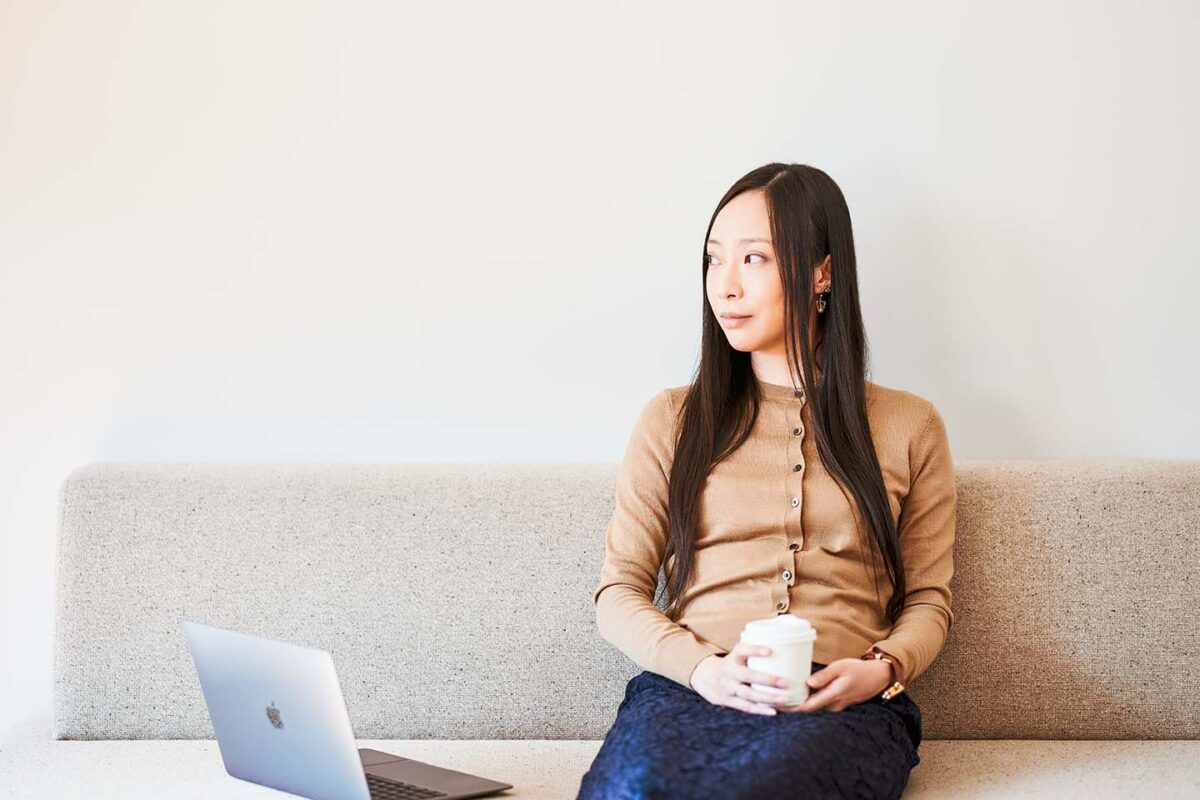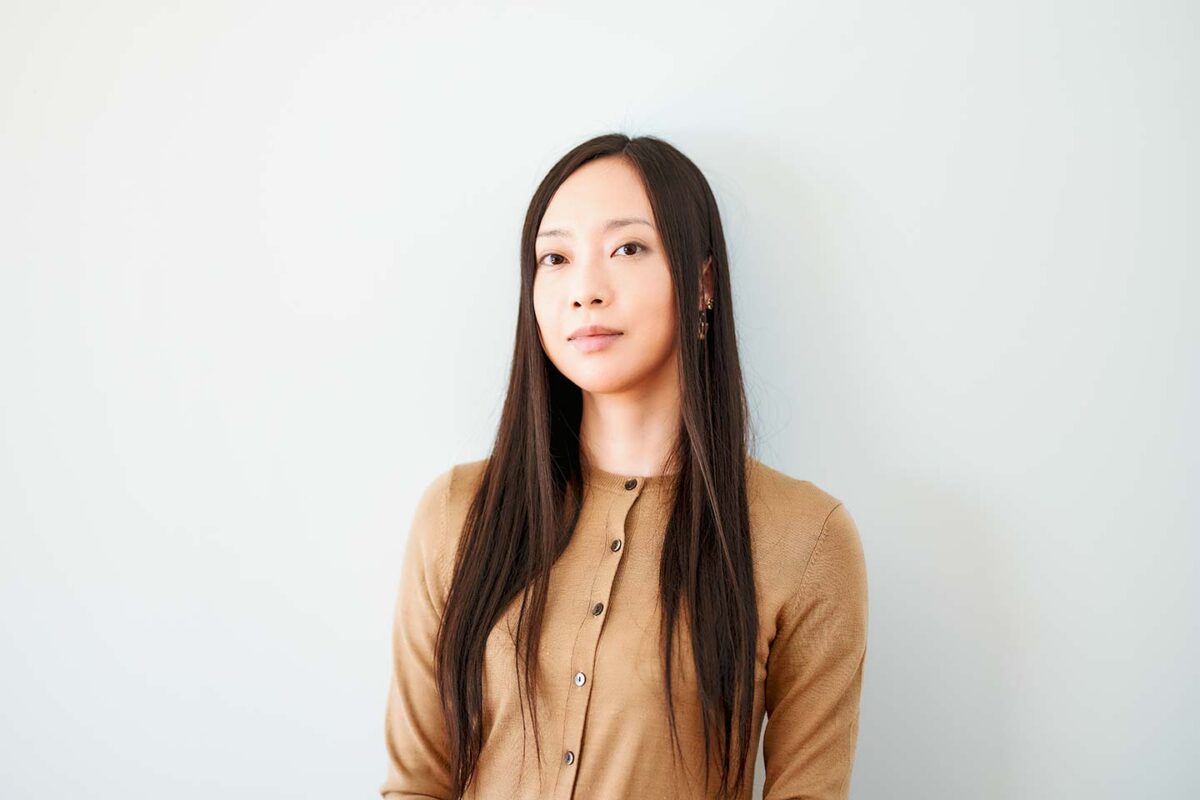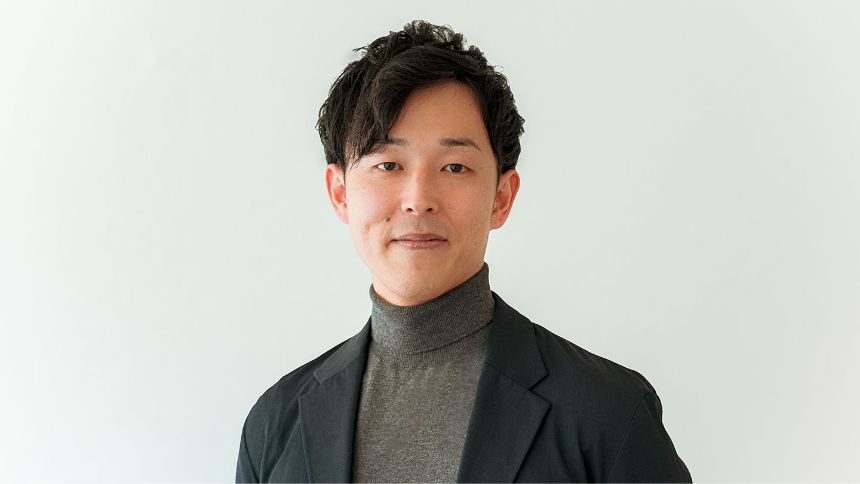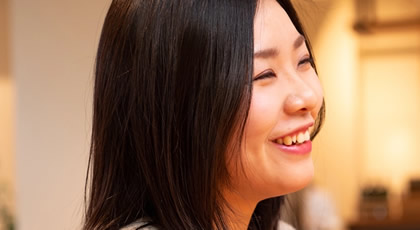
Pursuing Justice: Overcoming Divides to Build a World Where Hard Work Pays Off
How can we make society better? How can we fix its structural problems? These are the questions that have driven Shizuka Funayama’s career. For over 10 years, she has worked across the field of international cooperation, taking on roles at a trading company, an embassy, and an NGO, and even working with a social venture as a freelancer. In April 2023, she joined TYPICA, and in November that year, she was appointed as an Executive Officer.
Now, as part of the President’s Office, Funayama is focused on creating a blueprint for TYPICA to become a “super company” – one where every employee can live a fulfilling life and unleash their full potential. She also leads sustainability initiatives and manages government-funded projects. For Funayama, TYPICA is “the place that feels closest to realizing my ideal.”

Bridging divides with TYPICA
One memory from her university years is deeply etched in Shizuka Funayama’s mind. During a special lecture, she heard the story of a refugee — one of so-called boat people who had fled their homeland in a small fishing ship or sailboat, hoping to reach Japan from somewhere in Southeast Asia.
“When I fled my country,” the refugee said, “I boarded a boat with other refugees. We drifted at sea until a Japanese ship appeared nearby. We thought it had come to save us, that it would take us to Japan. But then, for some reason, the ship turned around…”
Her recollection of the event is a bit blurred, and some details may have been unconsciously altered. But one phrase the speaker said – “But the ship turned around” – remains seared into her memory.
“My guess is that the crew on the ship wanted to help the refugees but couldn’t because of legal and regulatory restrictions. Imagining their struggle – having to abandon people in need despite wanting to save them – left me with a question: How can we address the root causes of these structural problems?”
Driven by this question, Funayama pursued a career in international cooperation after graduating from university. She began at a trading company specializing in Official Development Assistance (ODA) and later worked at the Japanese Embassy in Nigeria, where she helped design and manage aid projects. Feeling the need for more systematic knowledge, she entered graduate school to study social entrepreneurship in Africa. She went on to join the NGO Peace Winds Japan, spending about three and a half years supporting people in humanitarian crises caused by natural disasters and conflicts. There, she managed projects funded by Japan’s Ministry of Foreign Affairs and the United Nations.
Yet, time and again, she hit roadblocks. Regulatory and financial constraints limited how far she could go, and the impact she could create was capped. In a world consisting of sovereign states, it’s difficult to intervene in ways that could be seen as domestic interference. Even the United Nations struggles to solve fundamental issues. Realizing this, Funayama concluded that independent companies with stable funding were better equipped to take action. As a freelancer, she worked with a social venture that offers services to Bottom-of-the-Pyramid (BOP) populations in developing countries. But even then, she couldn’t envision these projects scaling across continents.
“The social venture I worked with made tangible progress in the developing world and is still growing. But I felt there was a limit to what they could achieve simply because they were labeled as a ‘social business.’ Making the world a better place is often seen as at odds with the economic goals of regular private companies, and this creates an unbridgeable divide between those who care about solving social issues and those who don’t.
That’s where TYPICA is different. It’s a ‘regular company’ that distributes green coffee beans to roasters and consumers, but it also tackles issues like poverty and human rights for producers as a natural extension of its business activities. It’s this seamless blend of business and social impact that makes TYPICA so social.
Right now, I’m helping push efforts forward to address those issues as part of the President’s Office. In the future, though, I imagine something even bigger, like a coalition of companies like TYPICA that transcends the frameworks of governments and nations. If such a group could gain real influence, I think it could bridge divides and solve the structural problems in society.”

Building a world where hard work pays off
There’s a famous saying in international cooperation: “Don’t give a man a fish. Teach him how to fish.” While providing money or supplies can certainly help people, it’s not always sustainable. When people get used to receiving aid or obtaining things without effort, they often become reliant on help.
“I don’t think everyone should be saved in the same way. For example, even in refugee support, I’ve occasionally heard about cases, albeit a few, that are similar to welfare fraud. Some people live at home but register as refugees at camps to receive aid supplies, which they use to save on living expenses and build up savings.
In Japan, too, you see people protesting with placards to demand policy changes because they’re in disadvantaged positions. There’s no doubt that the system has flaws, and those demonstrations are one way to approach it. But personally, I think it’s more important to first try to shape your own future through your own efforts rather than placing all your hopes in the system.
If we want to change society, it ultimately comes down to how individuals choose to live their lives. Upbringing and circumstances do influence whether someone can make an effort, but I think what truly drives people to rise above those limits isn’t institutional support but emotion and determination.”
As a university student, Funayama formed a vision that’s stayed with her ever since: to see justice realized. While she’s changed organizations and problem-solving approaches along the way, every decision she’s made has been the best one available to move her closer to that vision. For now, TYPICA feels like the best choice to fulfill her mission.
“Through TYPICA’s platform, coffee produced with so much care and effort by small-scale farmers can be properly valued and sold at fair prices. This can improve their quality of life, give families enough financial security to send their children to school, and help them dream of a brighter future. I believe TYPICA has the potential to build a model where hard work pays off, spreading that sense of justice to communities around the world.”
Children don’t get to choose the country, society, or family they’re born into. The reality is, a child’s opportunities in life are heavily influenced by things like a country’s political situation, a family’s financial status, cultural resources, or even their parents’ social circles. These factors can create massive and often insurmountable disparities in a child’s future.
“Even now, I sometimes wonder how different my life might have been if I’d grown up in a different environment. For example, I never thought I could become a doctor or a scholar, but if I’d had someone like that around me, maybe that would’ve seemed like a natural path to follow. While the possibilities for each person are infinite, how many of those feel realistic or within reach depends a lot on what’s in your immediate surroundings, and that can change your whole life. I think that’s why the refugee’s story during my university years, about having their potential stolen away, stuck with me so deeply.”

Caught between self and society
Funayama’s unwavering pursuit of justice is rooted in her unconventional upbringing. Her father was an eccentric and often reckless man who barely worked and, when drunk, would even abuse the family’s pet cat. She describes him as “a bizarre person whose behavior defied what you’d expect from a reasonable adult.” He was the kind of troublemaker who would queue up at electronics stores early in the morning for special sales and, if the items were sold out, would make a scene until he got what he wanted.
It was impossible for her to feel any respect for him. Although he was her biological father, she couldn’t accept him as part of her family. By elementary school, she was regularly asking her parents to divorce. Eventually, they did, and when Funayama started junior high school, she began a new life with her mother and sister.
“After we moved out, my perspective on my father gradually began to change. For me, a father is a luxury item, something I wanted but couldn’t have. For a while, I struggled to reconcile who he really was with who I wished he could be. But when I met him as an older man more than 10 years ago, I started to see him as someone I might need to care for in the future, without resentment.
Growing up in the kind of household I did, the idea of depending on a man never even crossed my mind. When I was 20, I’d tell people, ‘I’m never getting married.’ But in my late 20s, I did decide to marry. I think part of me saw it as a way to grow into a responsible adult, but there’s no denying that societal expectations probably influenced me too.”
Funayama’s strong desire to live as an independent individual was often challenged by societal norms and stereotypes. This was the mid-1990s, a time when single-parent households weren’t as widely accepted in Japan as they are today. She remembers elementary school teachers asking questions like, “How many people are in your family?” expecting students to raise their hands. The assumption that “every home has a father” was something that never sat right with her.
Deeply ingrained stereotypes and assumptions often reveal themselves in casual, everyday moments. While attending Waseda University’s School of Political Science and Economics on a scholarship, Funayama encountered these biases frequently. During part-time job interviews, for example, she was often asked, “Is your father a banker or a trading company employee?” The question may have been innocent, but it always upset her.
“Questions like that came with an unspoken message: You must have grown up in a wealthy, comfortable household. It felt like all the effort I’d put in, and all the hard work my mother had done, was being dismissed. That was really frustrating. But if I tried to explain my family situation, people would act awkward, as if I’d said something inappropriate. Divorce is just a fact, but the inability to discuss my family background without judgment felt so unfair.”

Being a role model for others
After everything she’s been through, Funayama now wants to be a role model for others. She hopes her journey can offer encouragement to children from single-parent households, those growing up in tough financial situations, and women or young people struggling under society’s unspoken expectations.
“My path hasn’t been the standard one, and my career hasn’t been without its challenges. But now, I’m part of a socially impactful, fast-growing company, working remotely in a managerial role. I think that’s something I can be proud of.
You don’t have to live the way society expects you to. Your happiness is yours to define and yours to create. I want to say that with confidence, but I also feel like I’m still not completely free from the ‘shoulds’ society imposes on all of us.”
Funayama came to understand the cost of defying societal expectations most clearly when she chose to keep her last name after marriage. As of 2022, only about 5% of couples in Japan opt for the husband to take the wife’s surname, and cases not involving adopting a son-in-law are even rarer.
“Even expressing my desire to keep my name was a huge struggle for me. There was no logical reason beyond tradition to take my husband’s name, and I realized that if I didn’t stand by my decision, despite having every reason to do so, I’d lose the right to talk about women’s empowerment. That gave me the push I needed to bring it up.
My husband agreed without hesitation, but his parents never accepted it, and that strained our relationship. When I told male friends my age, some said things like, ‘That’s just wrong.’ But honestly, if men and women were truly equal, this kind of decision wouldn’t need to be so stressful or lead to conflicts with others.”

Who I am is the result of my mother’s work
Funayama wants to inspire others as a role model, but she’s never had one herself. Until university, she didn’t have any particular dreams or goals. Yet her academic achievements – graduating from the prestigious Waseda University and earning a master’s degree from University of Oxford – are undeniably impressive.
“If you just look at that part of my life, it might seem like I’ve worked really hard, but that’s not how I see myself. Maybe it’s because I had a good memory, but I was the kind of kid who almost always got perfect scores in elementary school without putting in much effort. Even getting into university felt like it just happened because I kept up with what everyone else was doing. Honestly, I think I was just lucky to have natural talent.
If I’ve been able to put in effort without realizing it, it’s thanks to the environment my mother created for me. Growing up watching her work diligently and without a single complaint, I probably absorbed that mindset as something natural. At the end of the day, who I am now is the result of my mother’s work. If anyone deserves credit for hard work, it’s her. In a way, I think of myself as her creation, her accomplishment.”
For Funayama, her motivation has always been to make her mother’s life easier and help fulfill her wishes. With only a junior college degree and no professional qualifications to her name, her mother had limited job opportunities. Even so, she worked tirelessly, moving between jobs with better conditions whenever possible and raising two daughters on her own. The memory of her mother’s dedication remains vivid to this day.
“I’ve never seen anyone work harder than my mother. Some mornings, she’d leave the house before us after making our lunch boxes. I can barely remember having dinner together at night. Even on weekends, she rarely took a full day off.
She raised us while taking care of all the housework on her own so that my sister and I could have a normal childhood. She never asked us for anything. She praised us when we did well on tests, teaching us that hard work pays off, and she always supported my decisions. It’s because of her sacrifices that I want to leave something behind for the next generation. And I saw TYPICA as the ideal place to do that.
That’s also why I’ve chosen to contribute as a role model rather than becoming a parent myself. As my mother’s creation, I feel like there’s a mission I need to dedicate my life to. If I centered my life around raising children, I’d lose sight of that. In today’s world, where diversity is often just a buzzword, I think it’s crucial, especially for women, to think about how we can contribute to society and what legacy we can leave behind. By living my life this way, I hope to show what’s possible and make my mother proud. That, to me, is the best way to repay her.”























